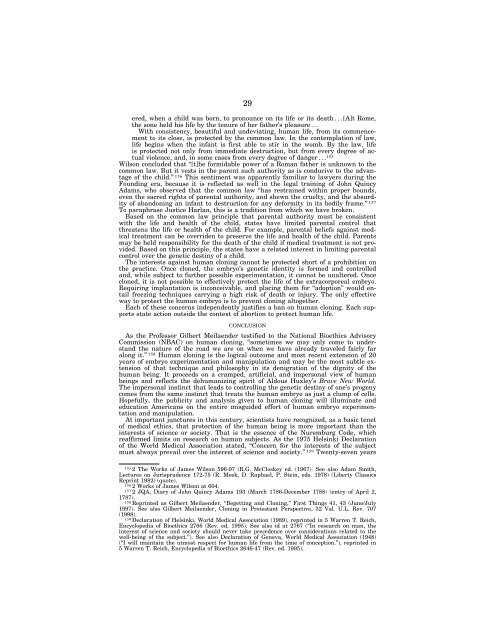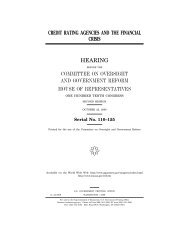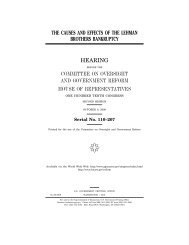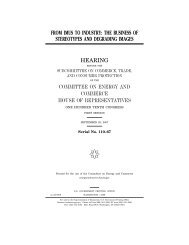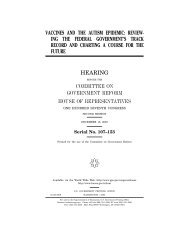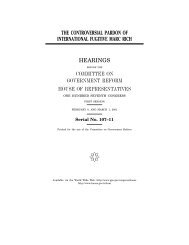28are their genes. We know that children are at least their genes, but they are morethan their genes. Children are not fungible and cannot simply be ‘‘replaced.’’3. The Diminution of Parental Responsibility—A third result of human cloning isa coarsening of the relationship between parents and cloned children. The NBACreferred to a ‘‘concern about a degradation in the quality of parenting and familylife.’’ 148 With cloning, children will be manufactured in ways that are highly subjectiveand particular. Because of highly subjective criteria, cloned children will be conditionallyaccepted; in fact, if the conditions are not satisfied, they will most likelynot be born at all—the embryos will be ‘‘discarded.’’ Such conditional acceptancetreats children as commodities or possessions. Consequently, ‘‘family relations arenecessarily diminished, turned into merely contractual relationships between autonomousindividuals.’’ 149As Leon Kass has testified:Cloning also represents a giant step (not the first) toward transformingprocreation into manufacture, children into artifacts and commodities, productsof human will and design. Cloning, like other nontherapeutic genetic engineering,is a form of despotism, an attempt to make children in our image and tocontrol in advance their future. It thus represents in blatant form a deep violationof the meaning of parent-child relations, of the meaning of procreativelysaying yes to our own demise and ‘‘replacement.’’ 150A resulting detachment between parent and child is not speculative. We see it alreadyin sperm and egg donation, as exemplified by the California Court of Appeals’decision in Jaycee Buzzanca. 151 Buzzanca was conceived from anonymous sperm andegg donors and born in 1995 to a surrogate mother (with her husband’s consent),contracted by John and Luanne Buzzanca. The Buzzancas separated shortly afterJaycee was conceived and subsequently divorced. Luanne Buzzanca, who had custodyof Jaycee since birth but had not adopted her, sued John Buzzanca for childsupport, and was ‘‘the only one of the six people who helped create her to claim parentalrights.’’ 152 A California Superior Court judged ruled that Jaycee had no legalparents, but the court of appeals reversed. Advocates for Jaycee argued that thecourt should focus on what is best for the child and not on the biological status ofthe Buzzancas, and the ACLU contended that the child has a ‘‘right to have parents’’that overrules the lack of legal precedent in California. The way to give meaningto a ‘‘the child’s right to have parents,’’ however, is by preserving biological linksand preventing detached, asexual reproduction through cloning, not by imposing parentalresponsibilities, after the fact, on people who do not have a biological linkwith the child. The California court of appeals explicitly urged the state legislatureto address the situation through legislation because ‘‘[t]hese cases will not goaway.’’ 153Cloning would overturn the traditional rule of Anglo-American jurisprudence thatlimits parental authority over the life and health of the child. The protection of vulnerablehuman life is reflected in the common law’s clear repudiation of the absolutepower of the Roman father over the life of the child and the common law’s elevationof legal protection for human life. Blackstone pointed out this contrast. 154 JusticeJames Wilson, one of the first associate justices of the Supreme Court, emphasizedthe common law protection for the unborn and newborn child:I shall certained by excused from adducing any formal arguments to evince,that life, and whatever is necessary for the safety of life, are the natural rightsof man. Some things are so difficult; others are so plain, that they cannot beproved. It will be more to our purpose to show the anxiety, with which somelegal systems spare and preserve human life; the levity and cruelty which othersdiscover in destroying or sporting with it; and the inconsistency, with which,in others, it is, at some times, wantonly sacrificed, and, at other times,religously guarded...[I]n Sparta, if any infant, newly born, appeared, to those who were appointedto examine him, ill formed or unhealthy, he was, without any further ceremony,thrown into a gulph near mount Taygetus...At Athens, the parent was empow-148 NBAC Report, supra note 134, at ii. See Kass, 32 Val. U. L. Rev at 697-98.149 Allen Verhey, Theology after Dolly, Christian Century, March 19-26, 1997, at 285.150 Leon Kass, supra note 134, at 21. A version of this testimony has been published as LeonR. Kass, The Wisdom of Repugnance: Why We Should Ban the Cloning of Humans, 32 Val. U.L.Rev. 679 (1998).151 Buzzanca v. Buzzanca, 72 Cal. Rptr. 2d 280 (Cal. App. 1998).152 Ann Davis, Artificial-Reproduction Arrangers Are Ruled Child’s Legal Parents, Wall StreetJournal, March 11, 1998, at B2.153 Buzzanca, 72 Cal. Rptr. 2d at 293.154 1 Blackstone 440.VerDate 11-MAY-2000 07:46 May 24, 2001 Jkt 000000 PO 00000 Frm 00032 Fmt 6633 Sfmt 6621 71495.TXT HCOM2 PsN: HCOM2
29ered, when a child was born, to pronounce on its life or its death...[A]t Rome,the sone held his life by the tenure of her father’s pleasure...With consistency, beautiful and undeviating, human life, from its commencementto its close, is protected by the common law. In the contemplation of law,life begins when the infant is first able to stir in the womb. By the law, lifeis protected not only from immediate destruction, but from every degree of actualviolence, and, in some cases from every degree of danger... 155Wilson concluded that ‘‘[t]he formidable power of a Roman father is unknown to thecommon law. But it vests in the parent such authority as is conducive to the advantageof the child.’’ 156 This sentiment was apparently familiar to lawyers during theFounding era, because it is reflected as well in the legal training of John QuincyAdams, who observed that the common law ‘‘has restrained within proper bounds,even the sacred rights of parental authority, and shewn the cruelty, and the absurdityof abandoning an infant to destruction for any deformity in its bodily frame.’’ 157To paraphrase Justice Harlan, this is a tradition from which we have broken.Based on the common law principle that parental authority must be consistentwith the life and health of the child, states have limited parental control thatthreatens the life or health of the child. For example, parental beliefs against medicaltreatment can be overriden to preserve the life and health of the child. Parentsmay be held responsibility for the death of the child if medical treatment is not provided.Based on this principle, the states have a related interest in limiting parentalcontrol over the genetic destiny of a child.The interests against human cloning cannot be protected short of a prohibition onthe practice. Once cloned, the embryo’s genetic identity is formed and controlledand, while subject to further possible experimentation, it cannot be unaltered. Oncecloned, it is not possible to effectively protect the life of the extracorporeal embryo.Requiring implantation is inconceivable, and placing them for ‘‘adoption’’ would entailfreezing techniques carrying a high risk of death or injury. The only effectiveway to protect the human embryo is to prevent cloning altogether.Each of these concerns independently justifies a ban on human cloning. Each supportsstate action outside the context of abortion to protect human life.CONCLUSIONAs the Professor Gilbert Meilaender testified to the National Bioethics AdvisoryCommission (NBAC) on human cloning, ‘‘sometimes we may only come to understandthe nature of the road we are on when we have already traveled fairly faralong it.’’ 158 Human cloning is the logical outcome and most recent extension of 20years of embryo experimentation and manipulation and may be the most subtle extensionof that technique and philosophy in its denigration of the dignity of thehuman being. It proceeds on a cramped, artificial, and impersonal view of humanbeings and reflects the dehumanizing spirit of Aldous Huxley’s Brave New World.The impersonal instinct that leads to controlling the genetic destiny of one’s progenycomes from the same instinct that treats the human embryo as just a clump of cells.Hopefully, the publicity and analysis given to human cloning will illuminate andeducation Americans on the entire misguided effort of human embryo experimentationand manipulation.At important junctures in this century, scientists have recognized, as a basic tenetof medical ethics, that protection of the human being is more important than theinterests of science or society. That is the essence of the Nuremburg Code, whichreaffirmed limits on research on human subjects. As the 1975 Helsinki Declarationof the World Medical Association stated, ‘‘Concern for the interests of the subjectmust always prevail over the interest of science and society.’’ 159 Twenty-seven years155 2 The Works of James Wilson 596-97 (R.G. McCloskey ed. (1967). See also Adam Smith,Lectures on Jurisprudence 172-75 (R. Meek, D. Raphael, P. Stein, eds. 1978) (Liberty ClassicsReprint 1982) (quote).156 2 Works of James Wilson at 604.157 2 JQA, Diary of John Quincy Adams 193 (March 1786-December 1788) (entry of April 2,1787).158 Reprinted as Gilbert Meilaender, ‘‘Begetting and Cloning,’’ First Things 41, 43 (June/July1997). See also Gilbert Meilaender, Cloning in Protestant Perspective, 32 Val. U.L. Rev. 707(1998).159 Declaration of Helsinki, World Medical Association (1989), reprinted in 5 Warren T. Reich,Encyclopedia of Bioethics 2766 (Rev. ed. 1995). See also id at 2767 (‘‘In research on man, theinterest of science and society should never take precedence over considerations related to thewell-being of the subject.’’). See also Declaration of Geneva, World Medical Association (1948)(‘‘I will maintain the utmost respect for human life from the time of conception.’’), reprinted in5 Warren T. Reich, Encyclopedia of Bioethics 2646-47 (Rev. ed. 1995).VerDate 11-MAY-2000 07:46 May 24, 2001 Jkt 000000 PO 00000 Frm 00033 Fmt 6633 Sfmt 6621 71495.TXT HCOM2 PsN: HCOM2
- Page 1 and 2: ISSUES RAISED BY HUMAN CLONING RESE
- Page 3 and 4: C O N T E N T SPageTestimony of:Boi
- Page 5 and 6: ISSUES RAISED BY HUMAN CLONINGRESEA
- Page 7 and 8: 3Would human cloning lessen the wor
- Page 9 and 10: 5Chairman TAUZIN. Thank you, Mr. Ch
- Page 11 and 12: 7and cell therapy and beta cell dev
- Page 13: 9safety and the moral condition of
- Page 17 and 18: 13seen in the common phrase, being
- Page 20 and 21: 16a want of capacity to live were a
- Page 22 and 23: 18eight to ten weeks gestation as a
- Page 24 and 25: 20Washington v. Glucksberg ignores
- Page 26 and 27: 22tion decision. The father of ‘
- Page 28 and 29: 24been treated as ‘‘sui generis
- Page 30 and 31: 26Perhaps the three most compelling
- Page 34 and 35: 30ago, Nobel Prize-winning biologis
- Page 36 and 37: 32Mr. JOHN. Thank you, Mr. Chairman
- Page 38 and 39: 34Mr. GREENWOOD. The Chair thanks t
- Page 40 and 41: 36to turn undifferentiated human pl
- Page 42 and 43: 38these issues have not yet even be
- Page 44 and 45: 40really have a clue what those gen
- Page 46 and 47: 42mately 150 days of gestation and
- Page 48 and 49: 44Hill JR, Winger QA, Long CR, Loon
- Page 50 and 51: 46clones will not change a bit by t
- Page 52 and 53: 48technologies, we’re able today
- Page 54 and 55: 50from the testes of infertile men
- Page 56 and 57: 52not be taken away from people, be
- Page 58 and 59: 54a result of this declaration, I w
- Page 60 and 61: 56Too much pressure, too many expec
- Page 62 and 63: 58requires some level of scientific
- Page 64 and 65: 60an abnormal person. So I think it
- Page 66 and 67: 62to the world, back to this earthl
- Page 68 and 69: 64which is not true for cow which i
- Page 70 and 71: 66Ms. BOISSELIER. University of Hou
- Page 72 and 73: 68Ms. BOISSELIER. Soon.Ms. DEGETTE.
- Page 74 and 75: 70Mr. ZAVOS. No, no. We believe tha
- Page 76 and 77: 72cloning process. And without that
- Page 78 and 79: 74have to look at the structure of
- Page 80 and 81: 76Mr. LARGENT. So the answer is no,
- Page 82 and 83:
78that very much and you are excuse
- Page 84 and 85:
80that people have incorrectly stat
- Page 86 and 87:
82My name is Dr. Thomas Murray. I
- Page 88 and 89:
84human subjects against irresponsi
- Page 90 and 91:
86might be born as a result of this
- Page 92 and 93:
88ever, it is not unusual for the g
- Page 94 and 95:
90Mr. DEUTSCH. Because there really
- Page 96 and 97:
92Ms. ZOON. When we found out about
- Page 98 and 99:
94Mr. GREENWOOD. The time of the ge
- Page 100 and 101:
96Be that as it may I think there a
- Page 102 and 103:
98There has been progress in the cl
- Page 104 and 105:
100may find that it is a terrible e
- Page 106 and 107:
102entists tried to get this ban ov
- Page 108 and 109:
104lies in our hands. And we face a
- Page 110 and 111:
106clude Ireland, Israel, Italy, Fr
- Page 112 and 113:
108strict IVF and similar high-tech
- Page 114 and 115:
110while ‘‘clone then love’
- Page 116 and 117:
112What Cloning Is Not—The ‘‘
- Page 118 and 119:
114And the largest group of people
- Page 120 and 121:
116The last piece to the legal puzz
- Page 122 and 123:
118cloning law on both scientific f
- Page 124 and 125:
120mendous potential human safety r
- Page 126 and 127:
122age him to do this research and
- Page 128 and 129:
124I realize there have been calls
- Page 130 and 131:
126‘‘from which I have no assoc
- Page 132 and 133:
128TO HAVE CHILDREN,’’ I ask th
- Page 134 and 135:
130of ourselves as humans in our pr
- Page 136 and 137:
132Our Genetic Science Task Force c
- Page 138 and 139:
134But this was also true in occide
- Page 140 and 141:
136So we utilized good science to d
- Page 142 and 143:
138egg and so on. What you’re tal
- Page 144 and 145:
140Mr. DEUTSCH. I think that’s ac
- Page 146 and 147:
142and dad? We all did that when we
- Page 148 and 149:
144Food, Drug and Cosmetics Act or
- Page 150 and 151:
146Mister Chairman, the embryo may
- Page 152 and 153:
148The current low rate of cloning
- Page 154 and 155:
150TIME magazine’s pictorial, ‘
- Page 156 and 157:
152John A. Robertson, University of


